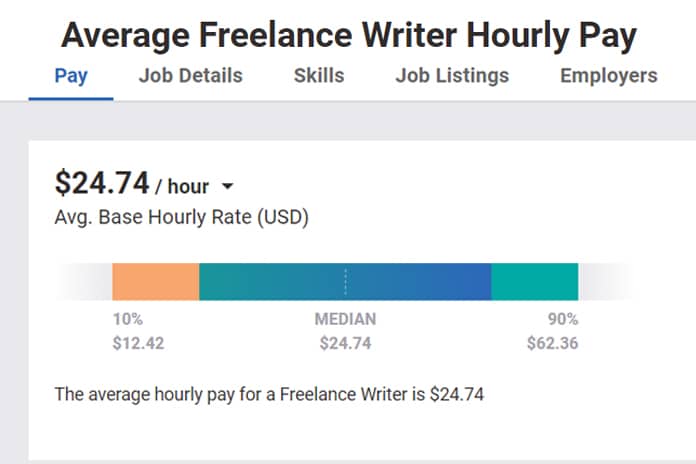Hiring a freelance writer can be a tricky process. It's not often like a traditional job interview. Where they went to school doesn't matter, their degree often doesn't matter, and no one cares about GPA. What matters is whether or not they can do the job, stick to the brief, and produce content on time.
The easiest way to hire a writer is, well, to hire a writer. Put out a job ad or go to a writing hub, find promising-sounding writers, and pay them to write a piece of content for you. Then, evaluate their content and see how it turns out. If the content is good, it passes plagiarism checks, and it's turned in on or before the deadline, you've probably got a good writer on your hands. If they don't live up to what you need, look elsewhere.
The problem with this approach is that it costs time and money. Good writers generally won't do a trial project for free because that's one major way companies exploit freelancers, and they've all been burned by it before. If turnaround for your posts is a week, and you're paying writers a decent amount of money – the best writers won't work for pennies, either – it can be months before you find someone worthwhile.
You can try to weed out poor candidates with an interview. Interviews are more traditional, but a simple Q&A with your candidates can be a good way to get a feel for them and their skill set, as well as their communication skills.
 Just be aware that, no matter how good they sound in an interview, the proof is in the pudding; if they can't deliver excellent writing on time, it doesn't matter what they said in an interview. After you've built a shortlist of candidates after interviewing, always give them a writing test before hiring.
Just be aware that, no matter how good they sound in an interview, the proof is in the pudding; if they can't deliver excellent writing on time, it doesn't matter what they said in an interview. After you've built a shortlist of candidates after interviewing, always give them a writing test before hiring.If you want to try an interview, here are fifteen good questions you can ask, and what kinds of answers you want to hear.

First up, it can be a great idea to ask what experience your potential writer has in the industry you're covering. Not having experience doesn't disqualify a writer – good writers can research anything and write expert-level content in short order – but past experience can be indicative of how easy it will be to discuss more nuanced topics and opinions. Just be prepared, if you hire someone with no experience in your field, to provide them with basic resources and training they need to write with authority. At the very least, you should be available to answer questions they may have.

While averages vary, some writers take 2-3 hours to produce a single blog post, while others might take 8+ hours, and still others take days. This can be an indication of the quality and care they put in, but it can also be indicative of their knowledge of the subject, their expertise, and even just how quickly they can write. Slow isn't bad, but neither is fast. Mostly, you want to know how long it takes them to write content, so you know how much they can produce in a given week and you don't overload them.

You generally won't be able to monopolize a writer. Many writers feel uncomfortable if they aren't working for multiple clients at once because if any of them disappear or fail to pay, the writer has a fallback. When you ask how many clients they tend to work for, you gain additional context about the volume of work you can ask them to complete, the burden it places on their time and efforts, and even how likely they are to decide you aren't worth the effort if your requirements are too burdensome compared to other clients.

Writers are humans. Many different reasons can cause them to miss a deadline. Medical issues, family issues, illness, unexpected workloads, power failures, computer failures; there are a million different excuses. What's important is how they handle it. Ideally, your writer will be proactive in communicating the problem and can work with you to either deliver what they have for you to finish or be given an extension. Of course, as the client, you benefit from building a backlog so you can offer more leeway, which helps both you and your writer.

Some freelance writers specialize 100% in writing and don't do anything else. They might not even want to write everything; some only write blog posts, and some prefer writing things like product descriptions, press releases, or white papers. Some will happily do meta data, alt text, and captions, while others leave that to the rest of the team. More importantly, you may want to know if your writer can do things like create images, handle links properly, create meta data, publish, or post to social media. These can be valuable but will mean you will want to pay the writer more.

Your writer candidates will have rates they typically charge for projects. Sometimes they'll mention these up-front, and other times you'll need to ask. There's usually room to negotiate, and they may want you to set a number first in case you're willing to offer more than their usual rates. Remember that rates can vary depending on how you pay your writers, what you're asking them to do as part of the project, the length of the project, and how picky you're going to be with revisions and nitpicks. The easier you are to work with, the more likely it is that the writer will accept a lower rate, though there's no way they can know that ahead of time.

Modern writing almost always involves SEO, unless you're hiring a writer to produce something like an eBook, a print article, or something that isn't meant for public consumption like tech documentation or an internal knowledge base. Ideally, you want someone who knows their way around keyword usage, web writing standards, formatting, and other quirks of writing for the internet that someone used to academic, print, or other forms of writing might not know. This is trainable or doable in a review before publication, but the more the writer can do, the less work you need to do to edit it into shape.

No writer is perfect. Even if they produce great content, it might not be quite what the client had in mind. Even a great writer, given the wrong directions or making the wrong assumptions, can produce content that just doesn't work. When a writer encounters a dissatisfied client, how do they handle it? Do they offer free revisions? Do they ask for clarification and edit to make the content better? Do they withdraw and charge for a repeat? Do they ghost the client? Watch out for red flags that would make the writer difficult to work with if they're off-base.

Ghostwriting is a tricky industry because many of the best relationships operate under NDA. The writer might have a lot of high-profile, extremely satisfied clients, but those clients don't want it known that they use ghostwriters, so they prevent their use as references. That said, most experienced writers should have a few good references on hand they can offer up upon request. You can then talk to those clients and verify information as necessary.

Most experienced freelance writers will have an invoice process down. This process usually involves them offering a contract for you to sign, receiving a content brief, producing work, and, upon receipt and acceptance, sending an invoice. Watch for things like additional fees for late payments or cancellation fees, which are signs the writer has experienced issues before and is adding clauses to ensure that they aren't working for free or being taken advantage of by unscrupulous clients. You're one of the good ones, of course, but they don't know that until you've proven yourself.

Freelance writers are, by definition, remote workers. You need to be able to communicate with them, and that means using the same platforms and working on the same page. Maybe they prefer video or voice chats, maybe they prefer instant messaging systems like Slack, Skype, or Discord, or maybe they prefer email. Just remember that, as a freelancer, you generally can't ask too much of them – they aren't beholden to attend your daily all-hands meetings, for example – unless it's part of the contract.

This is another question that helps you look for a problematic disconnect. Again, with a freelancer, you can't specify how or when they spend their time – you need to hire them as an employee for that – but you still want to know when they're most readily available to discuss projects. If they tend to work in the evenings and you're an early bird – or even if you both work mornings, but time zone disconnect means they're different times – it can be difficult to work together when an urgent issue arises. Of course, some writers work whenever they have a free moment and are available pretty much any time. It varies from writer to writer.

Some writers stick with their own experience and a good word processor. Others use cloud-based tools like Google Docs to collaborate. Some make heavy use of tools like Clearscope to optimize their content for SEO as they write. Many use external grammar checkers like Grammarly to refine content before submitting it. Some might even use some new AI-powered systems to help speed up their writing process. Make sure you know what kinds of tools they use and which ones (like AI writers or article spinners) might be red flags.

Writers have different lines they don't want to cross. Maybe they don't want to write about adult content, holistic health products, or cryptocurrency. Maybe they just don't trust themselves to write with authority on financial or medical topics at all. Maybe they'll write about anything, as long as it doesn't go against their political beliefs. Sometimes, none of this will be an issue. Other times, it might be exceedingly important to discuss. Know what the writer doesn't want to do before you ask them to do it and find out the hard way.

Even if you aren't sold on the writer, you want to ask them what they would want to get from you before they get started. A good writer should ask for things like samples of what you're looking for, specifications of brand voice/tone/style, any brand assets they should be using or a branding guideline, any internal resources they'll be expected to know about and use, access to accounts they'll need to use, a signed contract, and more.
Finding top-tier writers isn't hard, but finding top-tier writers you can afford to hire, who are willing to work with you, and who you get along with can be a lot harder. An interview, even if it's relatively informal, can be a good way to find out how you're likely to get along, what kind of relationship you can build, and how well they'll be able to work with you.

With a little luck and a little experience, you'll be able to hire excellent writers. You just need to know how to do it, and that's why we're here, with resources just like this one.
Are you looking for any additional advice, that I haven't already listed, to hire the best possible freelance writer for your job? Do you have any questions or concerns about the process for hiring a freelance writer? If yes to either of these questions, be sure to leave a comment down below, and I'd be more than happy to assist you however I can!
We encourage you to share this article on Twitter and Facebook. Just click those two links - you'll see why.
It's important to share the news to spread the truth. Most people won't.